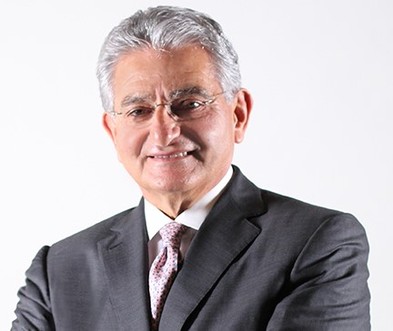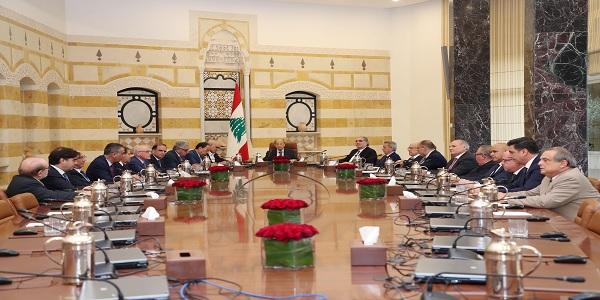
Lebanese bank deposits are safe and there is no need to panic, the head of the banking association said on Saturday, seeking to calm nerves about restrictions on some withdrawals imposed after nationwide protests.
Already facing the worst economic crisis since the 1975-90 civil war, Lebanon has been pitched deeper into turmoil since Oct. 17 by a wave of rallies against the ruling elite that led Saad al-Hariri to resign as prime minister on Oct. 29.
Crowds of protestors gathered again in central Beirut on Saturday, growing steadily into the evening, waving flags and playing music through loudspeakers. Demonstrators also took to the streets in Lebanon’s second city of Tripoli.
Since reopening a week ago, banks have been seeking to stave off capital flight by blocking most transfers abroad and imposing curbs on hard-currency withdrawals, though the central bank has announced no formal capital controls.
“We confirm that depositors’ money is safe and what is happening has nothing to do with solvency and therefore, no need to panic,” the head of the Association of Banks in Lebanon, Salim Sfeir, told a press conference.

Sfeir spoke after meeting President Michel Aoun, the ministers of finance and economy, the central bank governor and other officials over the economic situation.
In recent days, importers of fuel, wheat and medicine have said they faced difficulty securing the foreign currency needed for their purchases.
Economy minister Mansour Bteich said the Central Bank Governor Riad Salame reaffirmed that the funds for these strategic goods were secure, Lebanon’s al-Jadeed TV reported.
“We request the central bank governor, in cooperation with the banks association, to facilitate the necessary needs for depositors, specially small depositors, to preserve their economic and social situation, in addition to the necessary facilities to ensure the sustainability of the productive sectors,” Sfeir said.
One protestor said that people taking to the streets was a reflection of the bad economic situation, which she said could not get any worse.
“The economic situation was so bad, people could not continue anymore,” said Nadine Sangari, a public sector employee.
Caretaker Finance Minister Ali Hassan Khalil said the government would delay a $2 billion Eurobond issue that was planned for the end of the month but is fully committed to paying its maturing debt on time.
“Lebanon is committed to paying maturing treasury bonds in foreign currency, Eurobonds, at their predetermined dates and this commitment is confirmed,” Khalil told Reuters.
Lebanon has a $1.5 billion Eurobond maturing this month. The central bank has said it stands ready to pay off Lebanon’s maturing foreign currency debt. This will further reduce the Central Bank’s reserves.
The World Bank’s regional director on Friday urged Lebanon to form a new Cabinet “within a week” to prevent further degradation and loss of confidence in its economy.
Saroj Kumar Jha told The Associated Press that the World Bank observed in recent weeks increasing risks to Lebanon’s economic and financial stability.
“We are very concerned that this will impact the Lebanese poor people, middle class” and businesses, he said.
More than a week after PM Saad Hariri resigned, President Aoun has not yet set a date for consultations with heads of parliamentary blocs who would name a new premier. There appears to be sharp divisions over whether the new Cabinet should be made up of experts only or include politicians.
“It is extremely important that there is a political solution to the ongoing crisis and (that) we have a credible government in the office, which can launch ambitious bold reforms for economic stability, for more growth in the economy, for more jobs to be created and to restore confidence,” Jha added.
Jha said the losses “are enormous” and some of them can be measured but there are many that cannot. He said the World Bank estimates that before the protests started on Oct. 17, Lebanon was already in recession and “we were projecting 0.2% negative growth in the Lebanese economy. More recent “estimates suggest that the contraction in the country’s economy could be about 1% of the GDP, which is quiet substantial.”
He added this would almost mean 600 to 700 million dollars of economic losses every day.
Lebanon, which suffers from widespread corruption, has one of the highest debts in the world, standing at $86 billion or about 160 % of the GDP in 2018.
Protesters are taking a more targeted approach. In their crosshairs on Thursday was the nation’s central bank.
The country has been plagued by chronic shortages of cash. Many stand in long lines at ATM machines, only to find out the machines contain no money to withdraw. The situation has grown worse as demonstrations have forced bank closures.
“We are here to shut down the central bank because the bankers took all of our money from the country, and left us nothing,” one protester in Tripoli told FRANCE 24.
Yesterday Moody’s Investor Service downgraded Lebanon’s top three banks by assets further into junk status, after cutting the country’s rating last week, citing the weak creditworthiness of the government as mass protests show no signs of abating.
The ratings agency downgraded the local-currency deposit ratings of Bank Audi, Blom Bank and Byblos Bank to ‘Caa2’ from ‘Caa1’, Moody’s said on Thursday. It downgraded their foreign-currency deposit ratings to ‘Caa3’ from ‘Caa1′.
“The Lebanese government’s weakening creditworthiness is adversely affecting the three banks’ own creditworthiness given their large exposure to the Lebanese sovereign, which is their main source of risk,” Moody’s said in a statement. “In addition, the three banks continue to be exposed to the challenging Lebanese operating environment.”
The three banks’ ratings are under review for further downgrade, which will focus on a potential further deterioration in the government’s credit quality and any further pressure on the banking system’s liquidity.
The three banks overall exposure to the Lebanese government is the equivalent to seven to nine times their Tier 1 capital and more than half of their assets, Moody’s said, citing their 2018 financial statements. Such exposure links the banks’ creditworthiness to that of the heavily-indebted Lebanese government.
REUTERS/ AGENCIES

Leave a Reply
You must be logged in to post a comment.